Public Lecture by Asc Prof. Dr. Cheah Yoke Kqueen from Dept of Medical Science, Faculty of Medicine University Putra Malaysia, Padang April 27th 2017 in Faculty of Pharmacy Andalas University.
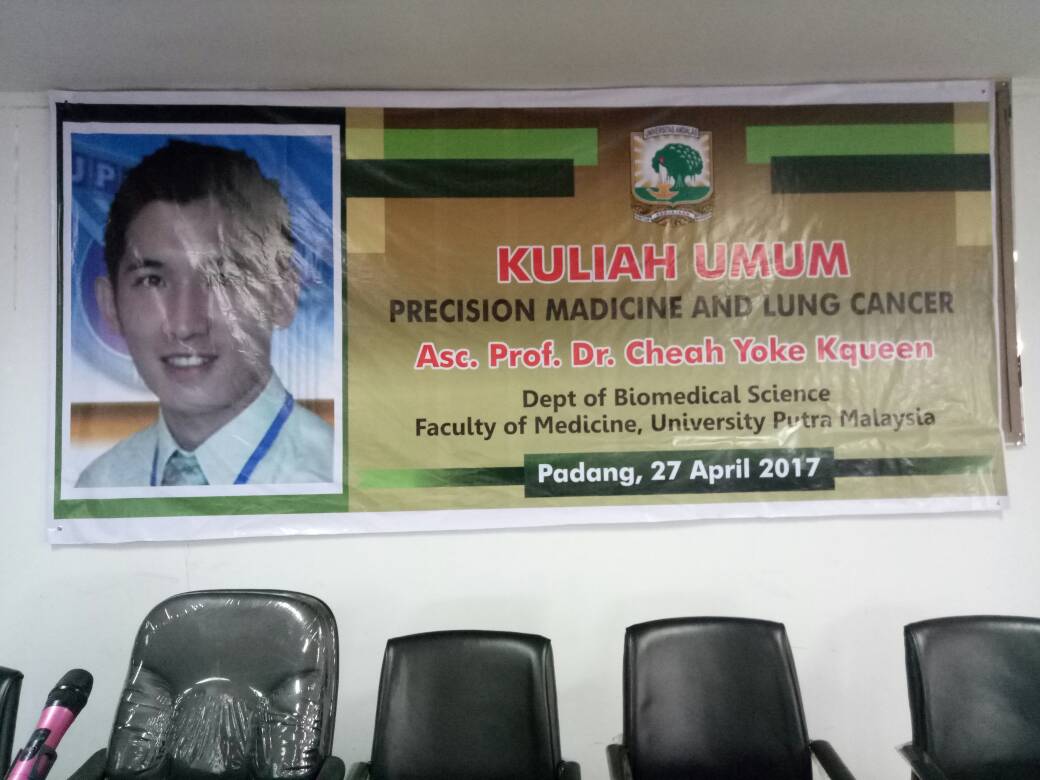
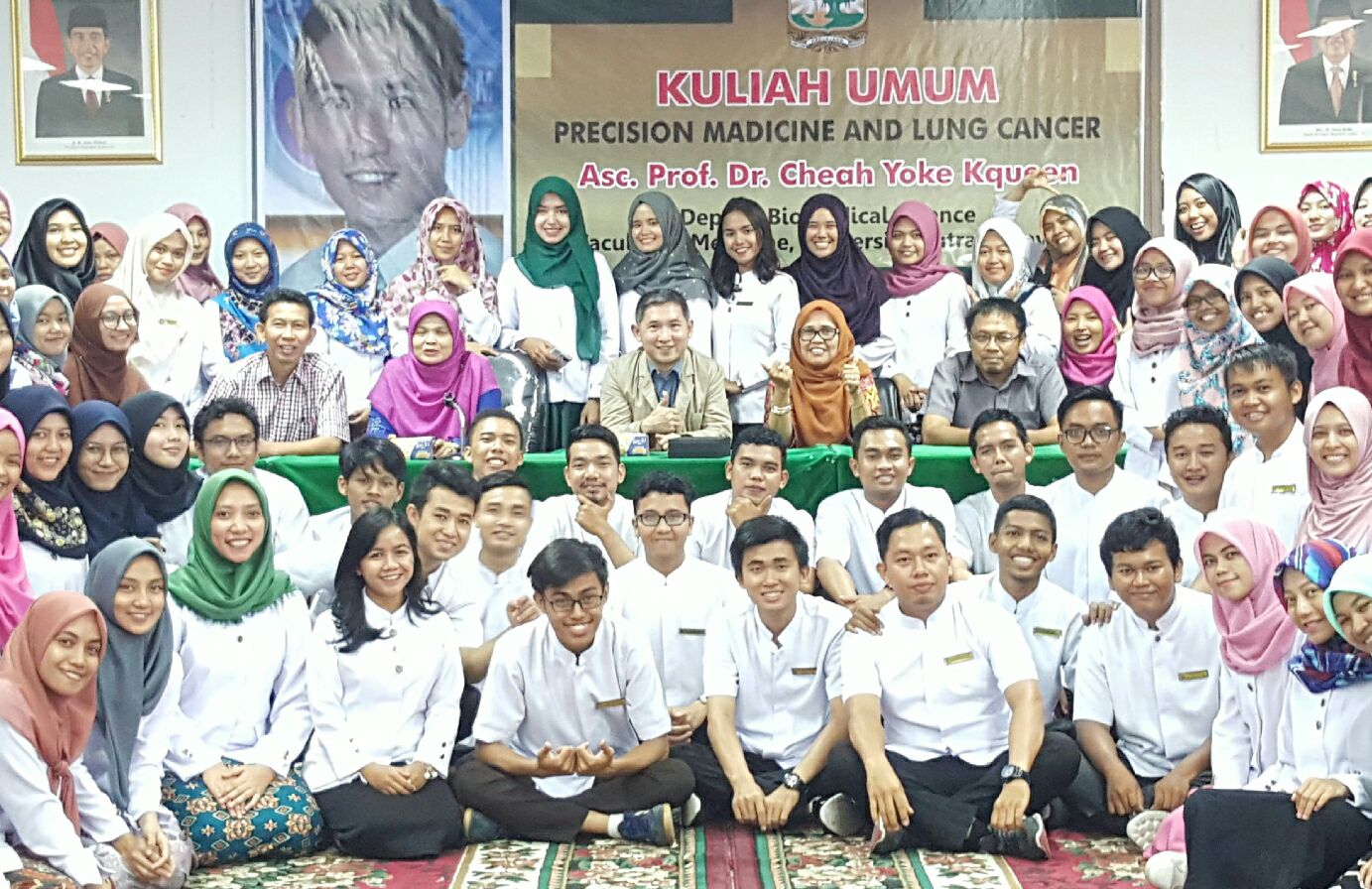
National Institutes of Health (NIH) define precision medicine as "an emerging approach for disease treatment and prevention that takes into account individual variability in genes, environment, and lifestyle for each person." Precision medicine will allow medical doctors and researchers to predict more accurately which treatment and prevention intervention for a particular disease will be effective in which groups of people. Although the term "precision medicine" is relatively new, the idea has been a part of healthcare for many years. Even though examples can be establish in several areas of medicine, the role of precision medicine in day-to-day healthcare is relatively limited. 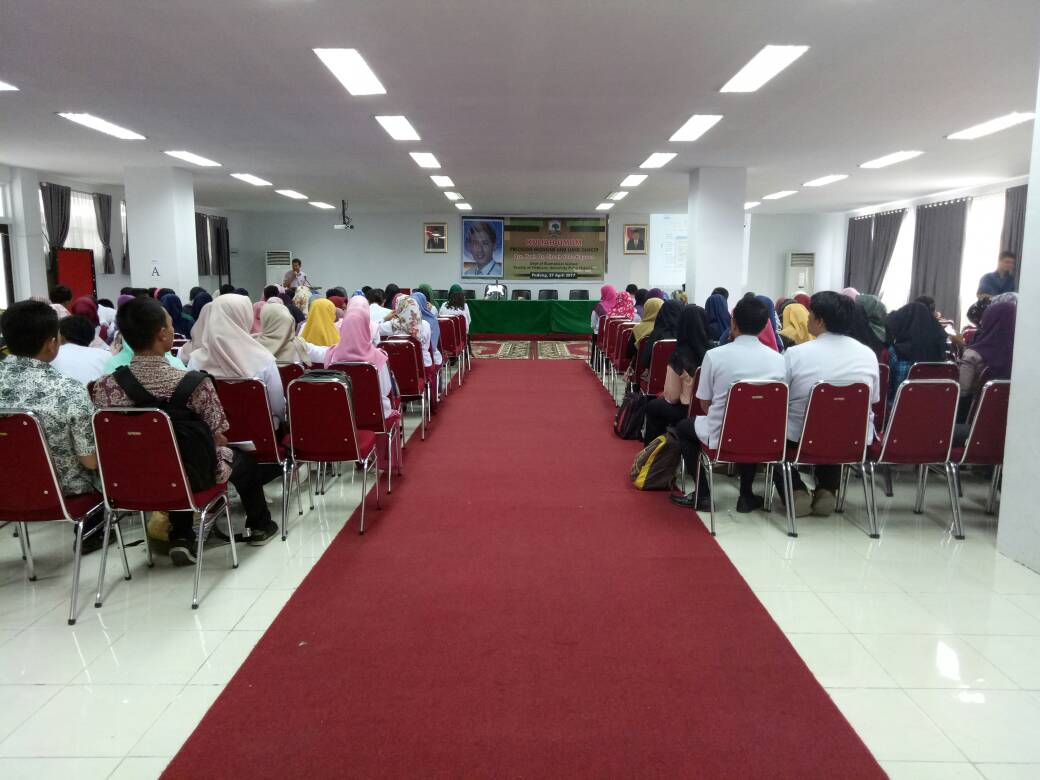 Globally, lung cancer remains the leading cause of cancer-related mortality. Non-small cell lung cancer (NSCLC) accounts for majority of lung cancers, and huge fraction of patients have metastatic disease at presentation. Chemotherapy, the standard treatment of metastatic lung cancer, results in a modest survival benefit compared to best supportive care, and has reached a plateau with no meaningful differences among the many platinum-based regimens used (Schiller et al., 2002).The discovery of Epidermal Growth Factor Receptor(EGFR) mutations that confer sensitivity to tyrosine kinase inhibitors in lung adenocarcinomas in 2004 signalled the beginning of the era of precision medicine for lung cancer.
Globally, lung cancer remains the leading cause of cancer-related mortality. Non-small cell lung cancer (NSCLC) accounts for majority of lung cancers, and huge fraction of patients have metastatic disease at presentation. Chemotherapy, the standard treatment of metastatic lung cancer, results in a modest survival benefit compared to best supportive care, and has reached a plateau with no meaningful differences among the many platinum-based regimens used (Schiller et al., 2002).The discovery of Epidermal Growth Factor Receptor(EGFR) mutations that confer sensitivity to tyrosine kinase inhibitors in lung adenocarcinomas in 2004 signalled the beginning of the era of precision medicine for lung cancer.
Since the discovery of tyrosine kinase inhibitors (TKIs) of EGFR, the understanding of markers for response to EGFR TKI has evolved from clinical variables, such as Asian ethnicity, female gender, never-smoker status and adenocarcinoma histology, to genetic markers for response, namely activating mutations in the EGFR tyrosine kinase domain, including the most frequent exon 19 deletions and exon 21 L858R mutations. On the other hand, the discovery of the echinoderm microtubule-associated protein-like 4 (EML4)-anaplastic lymphoma kinase (ALK) gene fusions as oncogenic drivers in lung cancer in 2007 marked another therapeutic advance in the management of lung cancer treatment (Soda et al., 2007). Clinical trials has demonstrated progression free survival superiority of crizotinib over both front-line and second-line chemotherapy in lung cancer patients with ALK positive NSCLC, leading to its approval in 2011.
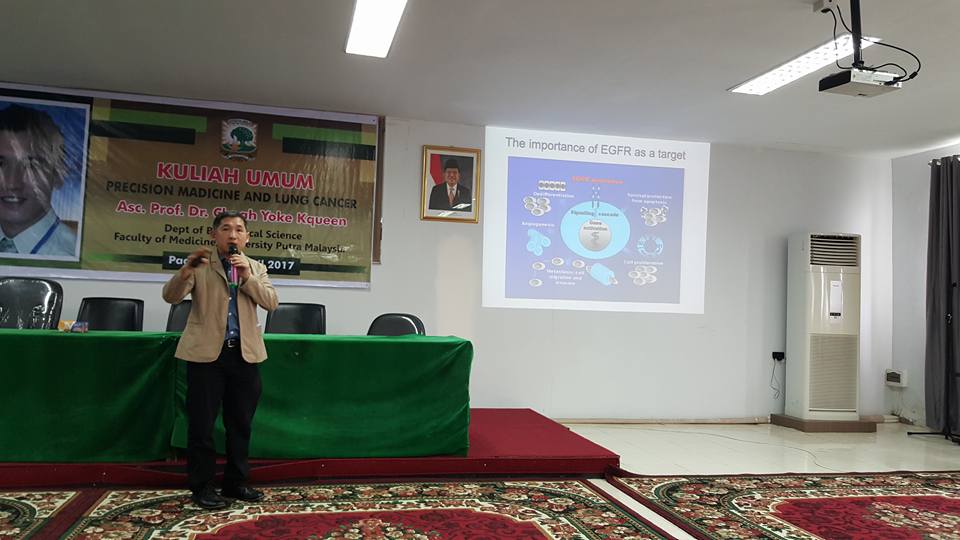 The molecular profiling of lung cancer using molecular diagnostic approach is useful to diagnose specific EGFR mutations and subsequently prescribe tyrosine kinase inhibitors as part of the targeted therapy. Moreover, the advancement of molecular diagnostic also plays an important role in the progress monitoring of the emerging drug resistant lung cancer cells. At the molecular level, the most common mechanism of resistance is the EGFR T790M resistance mutation. This finding has led to the development of third generation mutant specific EGFR TKI’s to specifically target T790M. Osimertinib is the first agent in this class to be granted accelerated approval by the FDA for the treatment of EGFR T790M positive NSCLC in 2015 based on the impressive results from the phase 2 trial (Janne et al., 2015)
The molecular profiling of lung cancer using molecular diagnostic approach is useful to diagnose specific EGFR mutations and subsequently prescribe tyrosine kinase inhibitors as part of the targeted therapy. Moreover, the advancement of molecular diagnostic also plays an important role in the progress monitoring of the emerging drug resistant lung cancer cells. At the molecular level, the most common mechanism of resistance is the EGFR T790M resistance mutation. This finding has led to the development of third generation mutant specific EGFR TKI’s to specifically target T790M. Osimertinib is the first agent in this class to be granted accelerated approval by the FDA for the treatment of EGFR T790M positive NSCLC in 2015 based on the impressive results from the phase 2 trial (Janne et al., 2015)
Likewise re-biopsies in ALK-positive NSCLC have provided information on the mechanisms of crizotinib resistance. Therefore, proper repeated biopsies and molecular diagnostics may influence the treatment choice
Challenges for the coming decade are to harness the fundamental understanding of lung cancer and novel therapeutics to develop cost-effective strategies that improve survival of patients with this disease. 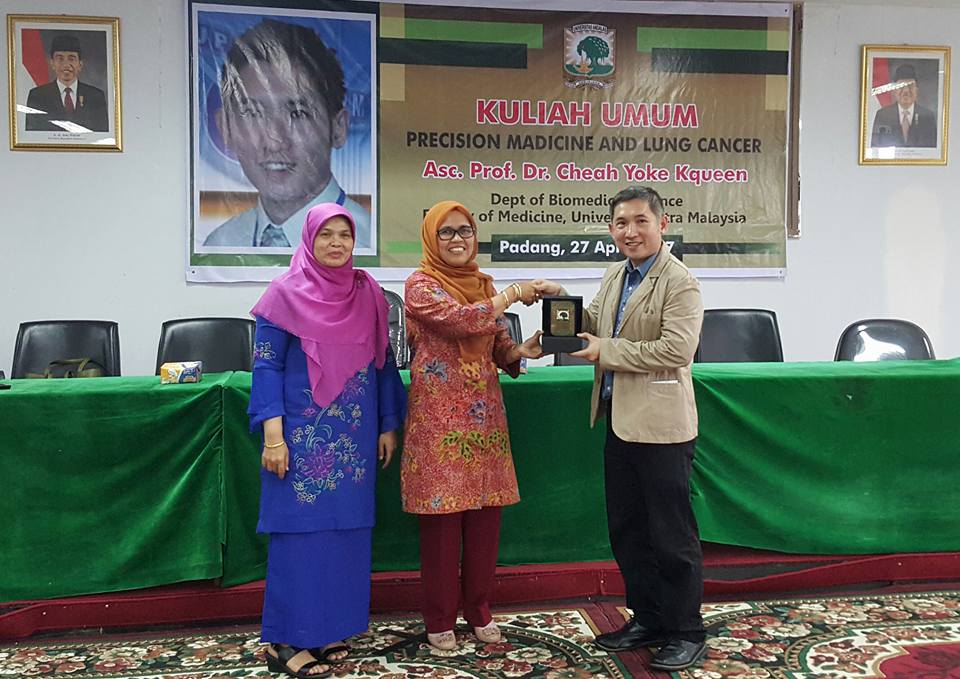
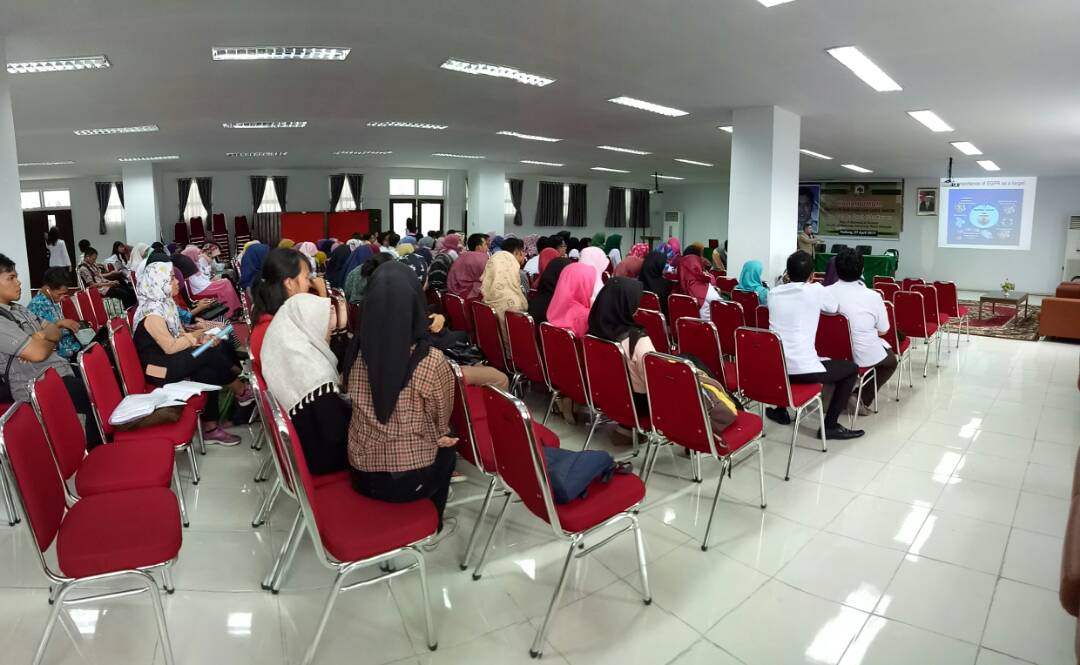
References:
Schiller JH, Harrington D, Belani CP, et al. Comparison of four chemotherapy regimens for advanced non-small-cell lung cancer. N Engl J Med 2002;346:92-8. 10.1056/NEJMoa011954
Jänne PA, Yang JC, Kim DW, et al. AZD9291 in EGFR inhibitor-resistant non-small-cell lung cancer. N Engl J Med 2015;372:1689-99. 10.1056/NEJMoa1411817
Soda M, Choi YL, Enomoto M, et al. Identification of the transforming EML4-ALK fusion gene in non-small-cell lung cancer. Nature 2007;448:561-6. 10.1038/nature05945
